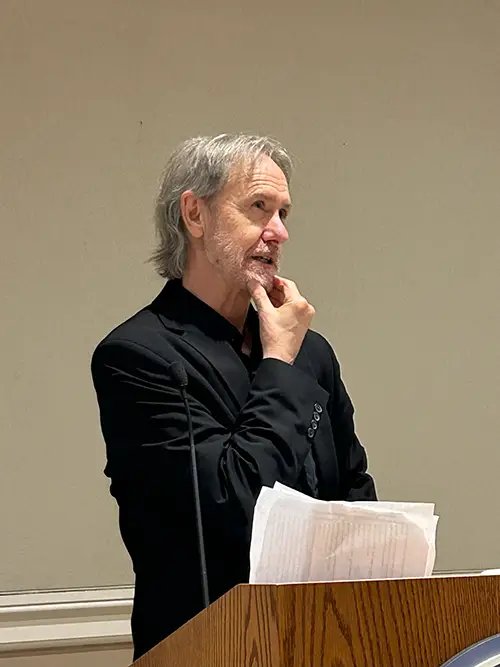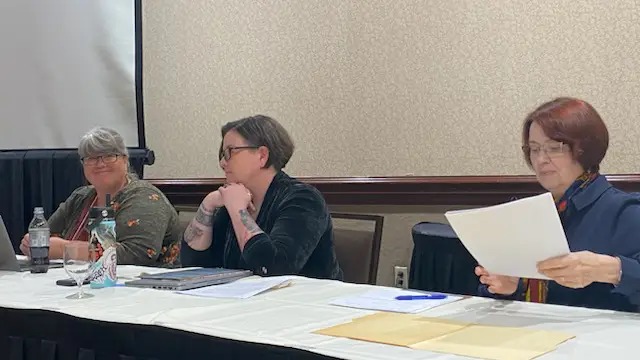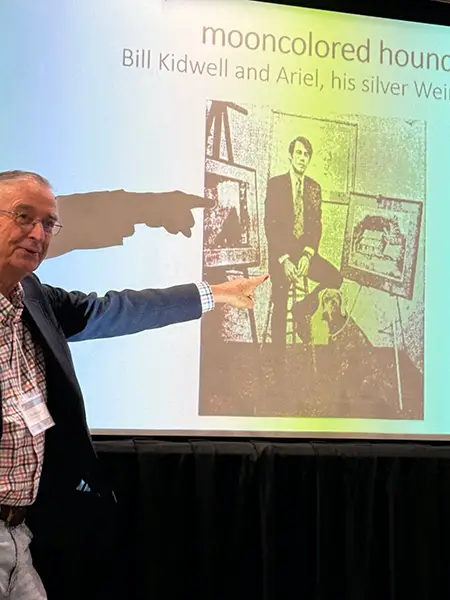Cormac McCarthy Scholars Convene in Knoxville



Cormac McCarthy scholars and enthusiasts had a rare opportunity in Knoxville this month to reflect on the award-winning author’s influences and impact.
The Cormac McCarthy Society brought its annual conference to town for the first time since the Department of English cosponsored the event in 2007, the same year his novel The Road won the Pulitzer Prize. “His first four novels are all set in East Tennessee, and as disturbing and violent as they are, they also speak about the region and to the region,” noted Associate Professor Bill Hardwig, one of the organizers.
A year after McCarthy’s death—and two since his last novels were published—the academic conference drew more than 80 participants from at least half a dozen countries around the globe. Author Ron Rash’s “Traversing Appalachia with Cormac McCarthy” lecture for the public drew 170.
The breadth of topics covered by dozens of conference presenters is reflected in those from the University of Tennessee, Knoxville. Hardwig, who has a book coming out next year on McCarthy’s language and style, discussed the classification of the natural world in his work. Senior Lecturer Brad Bannon, also in the Department of English, spoke about assassination conspiracies in his last novels. Wes Morgan, retired from the Department of Psychology, highlighted real people from Knoxville who show up in The Passenger.
“It was a really rich conference,” said Hardwig, noting McCarthy’s interest in topics including philosophy, spirituality, theology, mathematics, and physics. “Depending on your own interests, you can really go down a lot of rabbit holes with his fiction.”
For doctoral candidate Sarah Yancey, the conference was an opportunity to present and further her research.
McCarthy’s Medieval Influences
Yancey wasn’t impressed by McCarthy when she first read The Road in 2009. Taking Hardwig’s Appalachian Literature and Culture class during her master’s program, however, required her to read Child of God.
“I read the entire book in one day,” Yancey said. “Lester Ballard’s path in the story was just so obviously like Grendel’s in Beowulf that I couldn’t not notice it—he lives on the edge of society, he steals bodies and does horrible things to them, and he ends up losing an arm in his last confrontation.”
She explored the similarities in her final paper for the class and presented it at a medieval conference the following year. Her work also was published in the 2022 edition of Medieval Perspectives.
As part of her PhD coursework, Yancey read other McCarthy novels through a medieval lens. “Lo and behold, they were full of all kinds of references, ranging from early medieval to late Arthurian, and that’s where the scope of my dissertation started,” she said.
“I’m arguing for the afterlives of medieval texts—considering them as living artifacts that continue to shape cultures across generations, rather than solely as dusty manuscripts that people read a thousand years ago,” said Yancey, who is also part of UT’s Marco Institute for Medieval and Renaissance Studies.
“While these references continue to pop up throughout his writing career, I contend that the medievalisms in his first five novels—the Tennessee four plus Blood Meridian—present a carefully curated depiction of Appalachia and its people: a sort of elegy to a time and a people who are moving on and those who struggle with the transition,” she explained.
Collections at UT have given Yancey access to some of McCarthy’s correspondence and possible influences from when he was a student. “I’ve also been able to talk to a few people with anecdotal knowledge of McCarthy during his time here,” she said.
A research award from the Cormac McCarthy Society and a travel award from the Wittliff Collections, along with travel funds from the English department, have allowed her to visit McCarthy’s archives housed at Texas State University in San Marcos, as well as special collections at the University of Virginia in Charlottesville. She’s researched his correspondence, manuscript drafts, and interviews. “Being able to see his notes in the early drafts has been absolutely incredible,” she said.
Attending the conference also benefited Yancey’s research. By the end of the first day, she had talked with two scholars she cites in her dissertation, one of McCarthy’s longtime friends, and the author’s brother. “I got all kinds of new evidence, a bunch of reading recommendations, and several new friends,” she said.
The Department of English, Hodges Better English Fund, and the Arts and Humanities Strategic Excellence Fund provided support for the conference. A partnership with Knox County Public Library also supported Rash’s public lecture at the East Tennessee History Center.
Conference attendees had one opportunity that wouldn’t have been available anywhere else. Hardwig led about 20 on a 90-minute walking tour of Knoxville based on McCarthy’s novel Suttree. “You can still see glimpses of that world, even though he was writing about the 1950s,” said Hardwig, and seeing the layout of the city helped them understand the novel.
Discover more about McCarthy’s ties to Knoxville and his time at UT in this 2023 Torchbearer article.
By Amy Beth Miller